The Chief Revenue Officer (CRO) is responsible for overseeing all revenue-generating processes within a company. They align and optimize the efforts of sales, marketing, and customer success teams to drive growth and maximize revenue.
Skills required for a CRO include strategic thinking, leadership, and a deep understanding of sales and marketing dynamics. Additionally, they must possess strong analytical abilities and excellent communication skills to effectively lead their teams and make data-driven decisions.
Candidates can write these abilities in their resumes, but you can’t verify them without on-the-job Chief Revenue Officer skill tests.
In this post, we will explore 9 essential Chief Revenue Officer skills, 11 secondary skills and how to assess them so you can make informed hiring decisions.
Table of contents
9 fundamental Chief Revenue Officer skills and traits
The best skills for Chief Revenue Officers include Revenue Strategy, Sales Leadership, Market Analysis, Financial Acumen, Data-Driven Decision Making, Customer Relationship Management, Product Knowledge, Negotiation Skills and Cross-Functional Collaboration.
Let’s dive into the details by examining the 9 essential skills of a Chief Revenue Officer.
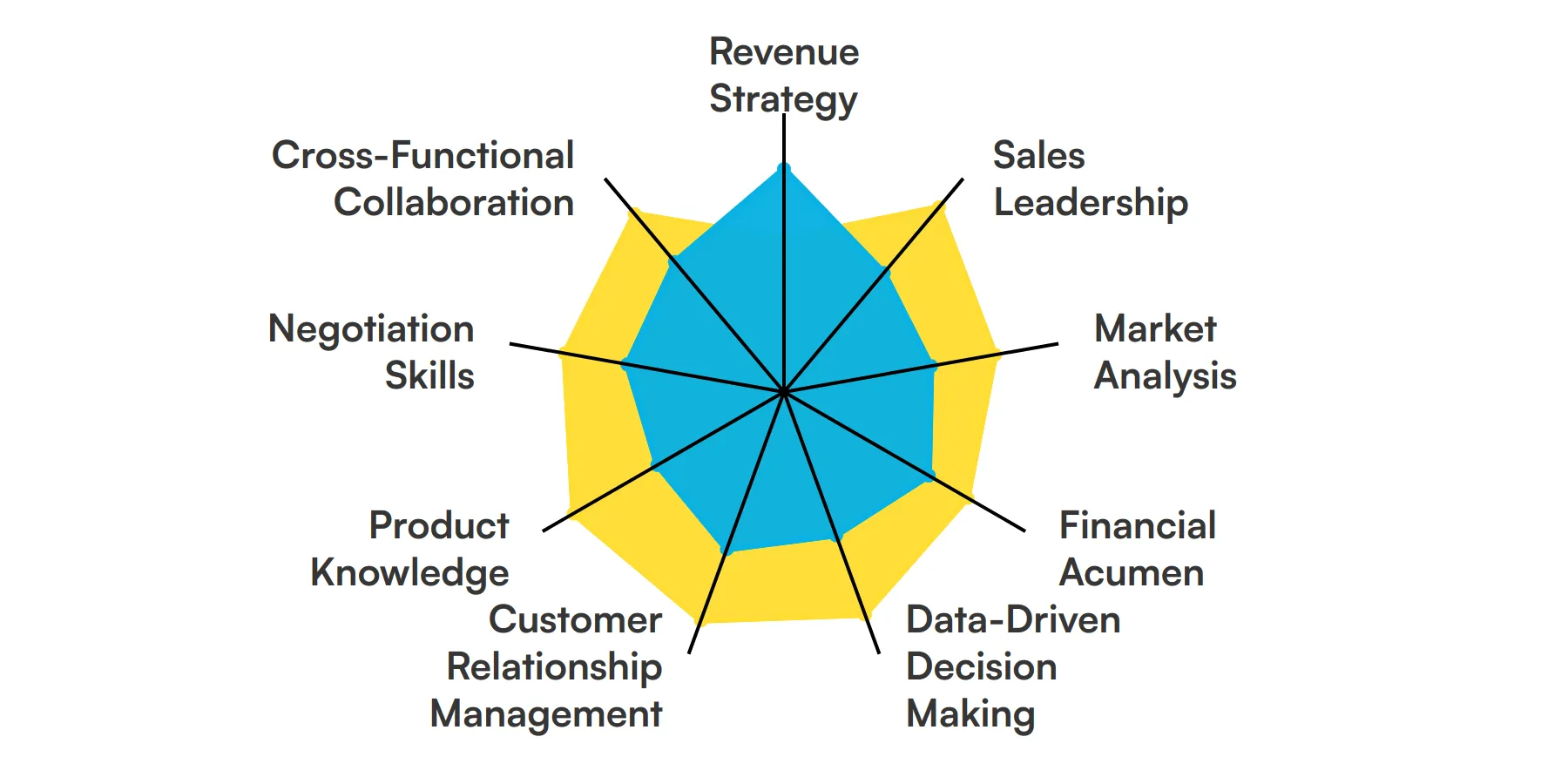
Revenue Strategy
A Chief Revenue Officer (CRO) must excel in crafting and executing revenue strategies. This involves identifying growth opportunities, setting revenue targets, and aligning the sales, marketing, and customer success teams to achieve these goals. The CRO uses this skill to ensure the company meets its financial objectives.
For more insights, check out our guide to writing a Chief Revenue Officer Job Description.
Sales Leadership
Sales leadership is about guiding and motivating the sales team to achieve their targets. The CRO leverages this skill to build a high-performing sales culture, develop sales processes, and ensure the team is equipped with the necessary tools and training. This is crucial for driving revenue growth.
Market Analysis
Understanding market trends and customer needs is key for a CRO. Market analysis involves researching competitors, identifying market opportunities, and staying updated on industry developments. This skill helps the CRO make informed decisions and adapt strategies to changing market conditions.
Financial Acumen
A strong grasp of financial principles is essential for a CRO. Financial acumen includes budgeting, forecasting, and analyzing financial statements. This skill enables the CRO to manage the company's revenue streams effectively and ensure financial stability.
Check out our guide for a comprehensive list of interview questions.
Data-Driven Decision Making
Making decisions based on data is critical for a CRO. This involves analyzing sales data, customer behavior, and market trends to inform strategies. By leveraging data, the CRO can optimize revenue operations and drive better business outcomes.
Customer Relationship Management
Building and maintaining strong customer relationships is vital for sustained revenue growth. The CRO uses CRM tools to track customer interactions, manage accounts, and ensure customer satisfaction. This skill helps in retaining customers and increasing lifetime value.
For more insights, check out our guide to writing a CRM Manager Job Description.
Product Knowledge
In-depth knowledge of the company's products or services is crucial for a CRO. This includes understanding product features, benefits, and market positioning. The CRO uses this knowledge to align sales and marketing efforts with the product's value proposition.
Negotiation Skills
Effective negotiation skills are important for closing deals and forming strategic partnerships. The CRO uses these skills to negotiate terms, pricing, and contracts that benefit the company. This helps in maximizing revenue and building long-term business relationships.
Cross-Functional Collaboration
A CRO must work closely with various departments, including marketing, finance, and product development. Cross-functional collaboration ensures that all teams are aligned towards common revenue goals. This skill helps in creating a cohesive strategy and driving company-wide success.
11 secondary Chief Revenue Officer skills and traits
The best skills for Chief Revenue Officers include Digital Marketing, Customer Segmentation, Sales Forecasting, Channel Management, Competitive Analysis, Pricing Strategy, Lead Generation, Customer Retention, Sales Training, Partnership Development and Tech Savvy.
Let’s dive into the details by examining the 11 secondary skills of a Chief Revenue Officer.
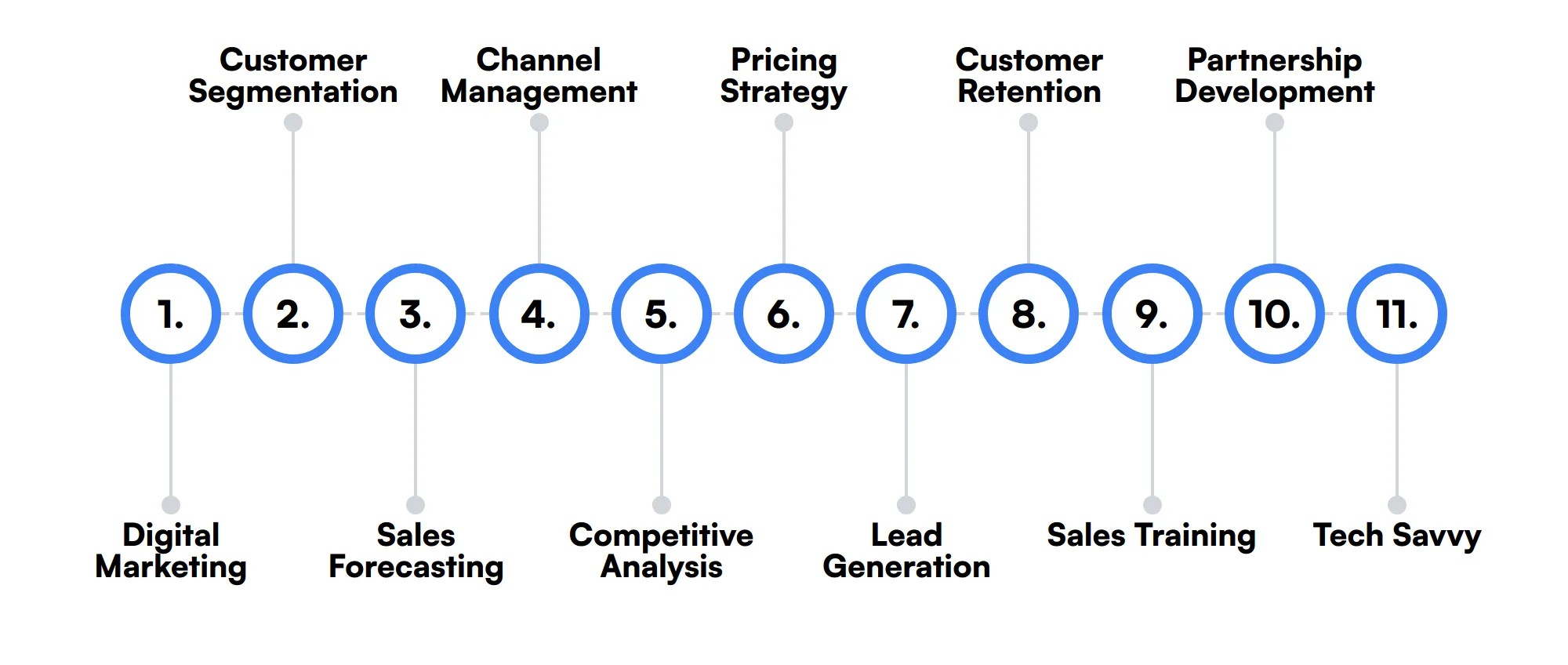
Digital Marketing
Understanding digital marketing techniques can help a CRO in driving online sales and lead generation. This includes SEO, content marketing, and social media strategies.
Customer Segmentation
Segmenting customers based on demographics, behavior, and preferences allows for targeted marketing and sales efforts. This skill helps in tailoring strategies to different customer groups.
Sales Forecasting
Accurate sales forecasting helps in planning and resource allocation. The CRO uses this skill to predict future sales and adjust strategies accordingly.
Channel Management
Managing different sales channels, such as direct sales, distributors, and online platforms, is important for maximizing reach. The CRO ensures each channel is optimized for performance.
Competitive Analysis
Analyzing competitors' strengths and weaknesses helps in positioning the company effectively. This skill aids the CRO in developing strategies to outperform competitors.
Pricing Strategy
Developing a pricing strategy involves setting prices that maximize profit while remaining competitive. The CRO uses this skill to balance value and revenue.
Lead Generation
Generating high-quality leads is crucial for sales growth. The CRO focuses on strategies to attract and convert potential customers into paying clients.
Customer Retention
Retaining existing customers is often more cost-effective than acquiring new ones. The CRO implements strategies to enhance customer loyalty and reduce churn.
Sales Training
Providing ongoing training to the sales team ensures they are equipped with the latest techniques and knowledge. This skill helps in maintaining a high level of sales performance.
Partnership Development
Forming strategic partnerships can open new revenue streams. The CRO identifies and nurtures relationships with key partners to drive mutual growth.
Tech Savvy
Being proficient with sales and marketing technologies, such as CRM systems and analytics tools, is beneficial. This skill helps the CRO in leveraging technology to enhance revenue operations.
How to assess Chief Revenue Officer skills and traits
Assessing the skills and traits of a Chief Revenue Officer (CRO) is a nuanced process that goes beyond just reviewing a resume. A CRO holds a critical role that combines expertise in revenue strategy, sales leadership, and market analysis with strong financial acumen and an ability to make data-driven decisions. These skills ensure the company's revenue growth aligns with its strategic goals.
Traditional hiring methods often fall short when it comes to evaluating such complex and diverse skill sets. This is where specialized assessments come into play. By utilizing tools like Adaface assessments, hiring teams can effectively measure a candidate's capabilities in areas like customer relationship management, product knowledge, and cross-functional collaboration. Adaface assessments are designed to mirror real-world scenarios, helping you to identify candidates who are not only skilled but are also a great fit for your company culture, potentially reducing your screening time by 85%.
Let’s look at how to assess Chief Revenue Officer skills with these 6 talent assessments.
Marketing Analysis Test
Marketing Analysis Test evaluates a candidate's knowledge in marketing analysis, digital marketing, Google Ads, PPC advertising, marketing aptitude, SEO assessment, Google Analytics, content strategy, copywriting, and data analysis.
The test assesses their understanding of marketing principles and their ability to analyze market trends and consumer behavior. It includes questions on marketing analysis, data analysis, and digital marketing.
Successful candidates demonstrate a strong grasp of content strategy, Google Analytics, and SEO assessment.
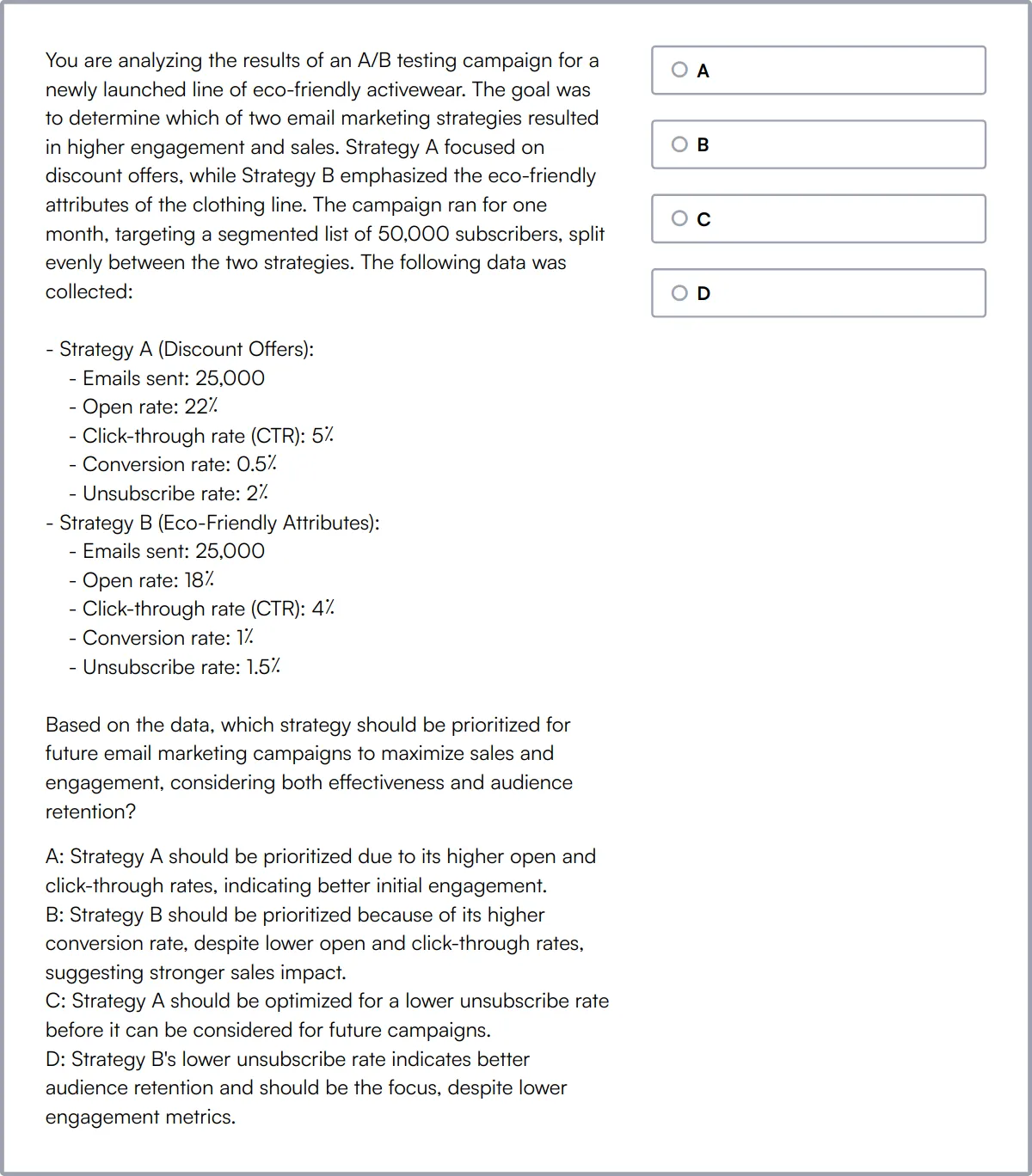
Sales Aptitude Test
Sales Aptitude Test assesses a candidate's ability to reach out to potential customers, maintain customer relationships, handle objections, and resolve conflicts using scenario-based questions.
The test evaluates skills in objection handling, negotiation, closing, and communication. It also covers logical reasoning, problem-solving, and critical thinking.
High-scoring candidates show proficiency in sales fundamentals and English proficiency.
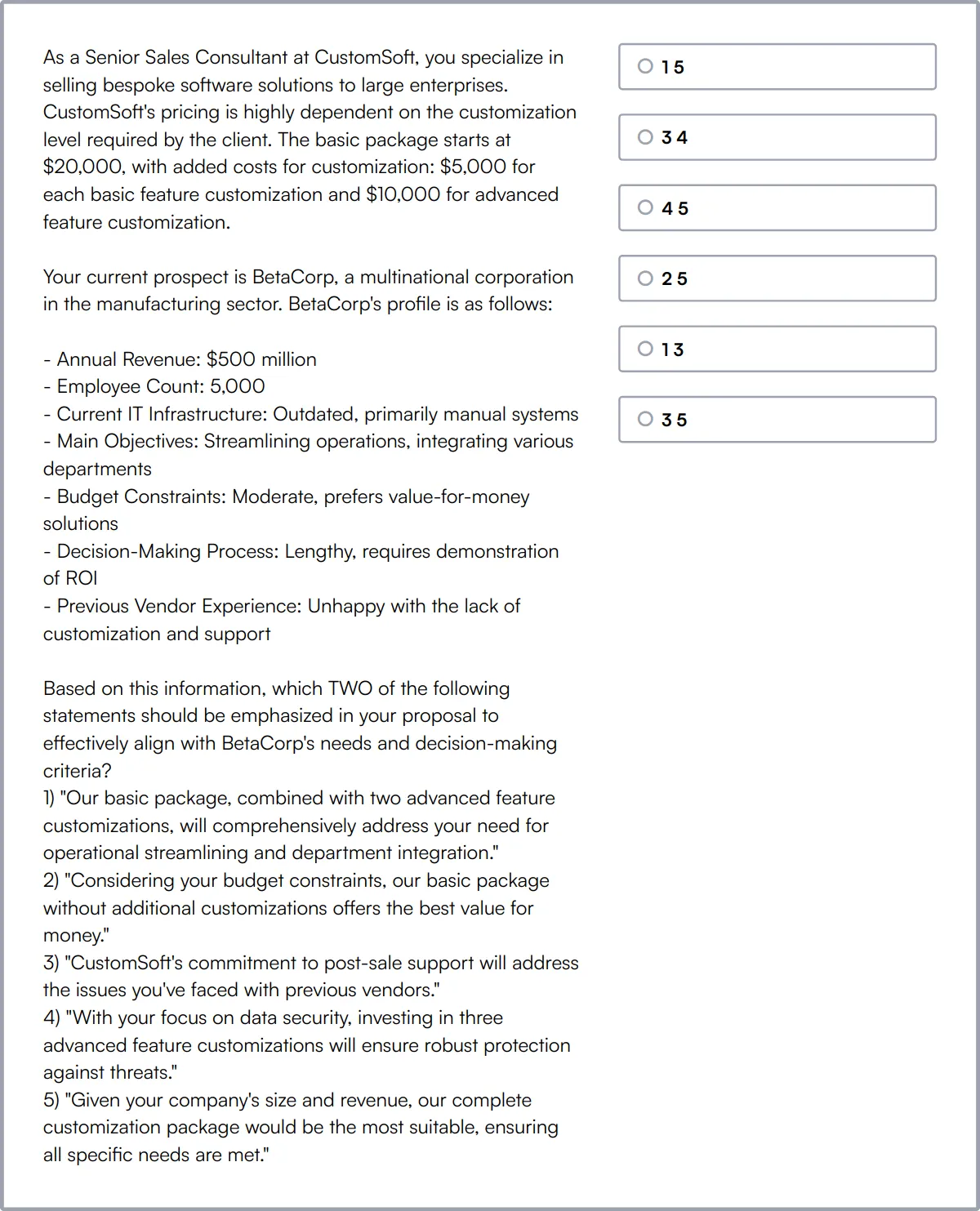
Market Research Test
Market Research Test evaluates a candidate's knowledge and skills in market research techniques, data analysis, quantitative aptitude, business intelligence, and marketing aptitude.
The test covers market research, data analysis, market analysis, and data interpretation. It assesses the candidate's ability to interpret and analyze market data.
Candidates who perform well demonstrate strong skills in data interpretation and business intelligence.

Financial Accounting Online Test
Financial Accounting Test uses scenario-based multiple-choice questions to evaluate a candidate's knowledge and skills related to financial statements and reporting, accounting principles, and financial analysis.
The test assesses understanding of financial statements, accounting principles, double-entry bookkeeping, and financial ratios. It also covers cash flow statements and inventory valuation.
Successful candidates show proficiency in financial analysis and income and expense recognition.
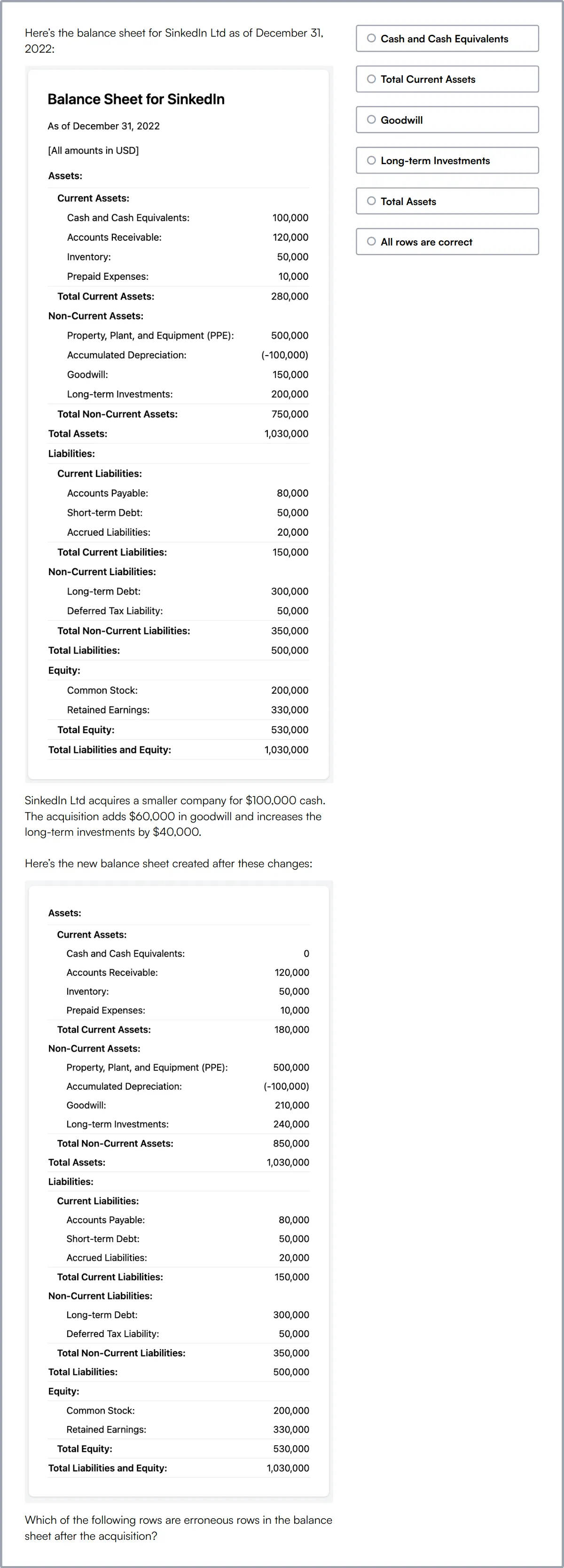
Data Analysis Test
Data Analysis Test assesses a candidate's ability to handle, modify, analyze, and interpret data using scenario-based MCQ questions.
The test covers data analysis, business analysis, data interpretation, and SQL. It evaluates the candidate's ability to find possible outcomes, detect anomalies, and extract meaningful insights.
Candidates who excel demonstrate strong skills in data queries and data operations.

Customer Service Aptitude Test
Customer Service Aptitude Test evaluates a candidate's skills in customer service, attention to detail, problem-solving, verbal reasoning, numerical reasoning, and logical reasoning.
The test assesses abilities in customer service, situational judgment, abstract reasoning, and verbal reasoning. It also covers communication skills.
High-scoring candidates show strong attention to detail and problem-solving abilities.
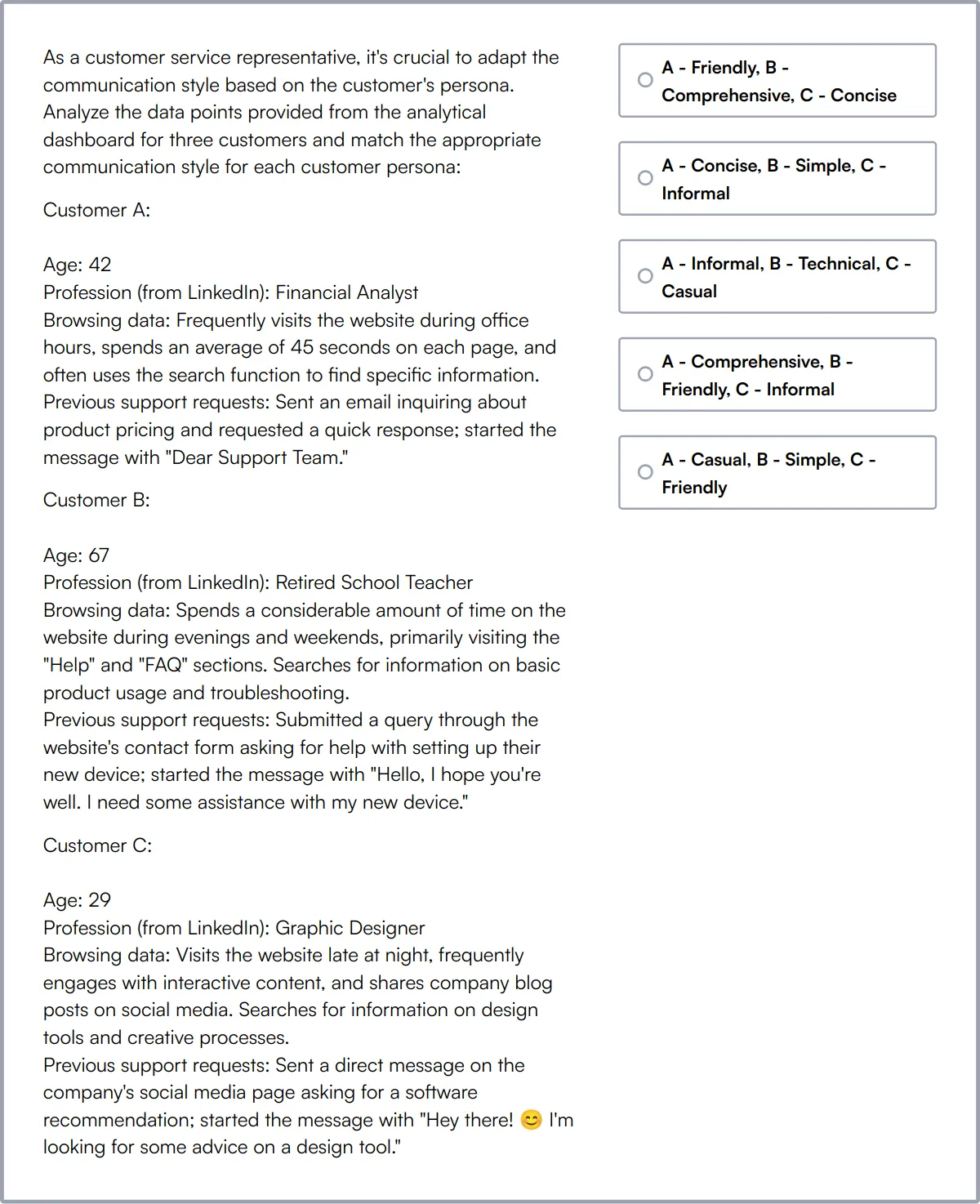
Summary: The 9 key Chief Revenue Officer skills and how to test for them
| Chief Revenue Officer skill | How to assess them |
|---|---|
| 1. Revenue Strategy | Evaluate ability to develop and implement plans to maximize revenue. |
| 2. Sales Leadership | Assess leadership in driving sales team towards achieving targets. |
| 3. Market Analysis | Check understanding of market trends and customer behavior analysis. |
| 4. Financial Acumen | Review proficiency in budget management and financial forecasting. |
| 5. Data-Driven Decision Making | Observe decision-making process using quantitative data analysis. |
| 6. Customer Relationship Management | Test skills in managing and enhancing customer interactions. |
| 7. Product Knowledge | Examine familiarity and expertise with the product offerings. |
| 8. Negotiation Skills | Assess ability to negotiate deals and manage conflicts. |
| 9. Cross-Functional Collaboration | Evaluate collaboration skills across different business units. |
Cyber Security Assessment Test
Chief Revenue Officer skills FAQs
What is the importance of revenue strategy in a Chief Revenue Officer role?
Revenue strategy is key for aligning sales, marketing, and product initiatives to drive growth. It involves setting revenue targets, identifying growth opportunities, and ensuring all departments work towards common financial goals.
How can recruiters assess sales leadership skills in a CRO candidate?
Recruiters can assess sales leadership skills by looking at the candidate's past performance in leading sales teams, their ability to inspire and motivate, and their track record in meeting or exceeding sales targets.
Why is market analysis important for a Chief Revenue Officer?
Market analysis helps a CRO understand market trends, customer needs, and competitive landscape. This knowledge is crucial for making informed decisions and identifying new revenue opportunities.
What role does financial acumen play in the success of a CRO?
Financial acumen allows a CRO to manage budgets, forecast revenue, and make data-driven decisions. It ensures the company’s financial health and supports strategic planning.
How can data-driven decision making impact a CRO's performance?
Data-driven decision making enables a CRO to base strategies on solid data, leading to more accurate forecasting, better resource allocation, and improved overall performance.
What are the key aspects of customer relationship management for a CRO?
Customer relationship management involves maintaining strong relationships with key clients, understanding their needs, and ensuring high levels of customer satisfaction and retention.
How important is product knowledge for a Chief Revenue Officer?
Product knowledge is essential for a CRO to effectively sell and market the company's offerings. It helps in understanding product strengths, addressing customer queries, and positioning the product in the market.
What are effective ways to assess a CRO candidate's negotiation skills?
Assess negotiation skills by reviewing past deal closures, asking situational questions during interviews, and checking references for feedback on the candidate's ability to negotiate favorable terms.

40 min skill tests.
No trick questions.
Accurate shortlisting.
We make it easy for you to find the best candidates in your pipeline with a 40 min skills test.
Try for freeRelated posts
Free resources



